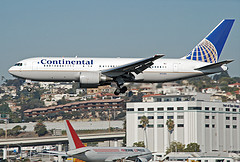Court Rules Airline Doesn’t Need To Accept Cash For In-Flight Purchases
The passenger sued Continental (now merged with United) following a 2010 flight from Honolulu to Newark, NJ. He claimed that he’d accidentally left his credit cards in his checked bags and was therefore unable to buy a $5 drink and $3 headset from the flight attendant.
The lawsuit alleged breach of contract, unlawful discrimination against low-income individuals who don’t possess credit cards and violation of New Jersey’s Consumer Fraud Act.
His case was initially dismissed by the New Jersey Superior Court in 2011, with that judge declaring, “The plaintiff has not shown me the policy is unreasonable or that he was not informed of it.”
And so he appealed his case, but the three-judge panel shot him down this morning, saying that federal laws regulate the airlines.
The Coinage Act of 1965 states that “United States coins and currency (including Federal reserve notes and circulating notes of Federal reserve banks and national banks) are legal tender for all debts, public charges, taxes, and dues.”
And though U.S. currency states that “This note is legal tender for all debts, public and private,” this does not mean that every person or business must accept currency for payment.
“[The Coinage Act of 1965] means that all United States money as identified above are a valid and legal offer of payment for debts when tendered to a creditor. There is, however, no Federal statute mandating that a private business, a person or an organization must accept currency or coins as for payment for goods and/or services. Private businesses are free to develop their own policies on whether or not to accept cash unless there is a State law which says otherwise. For example, a bus line may prohibit payment of fares in pennies or dollar bills. In addition, movie theaters, convenience stores and gas stations may refuse to accept large denomination currency (usually notes above $20) as a matter of policy.”
So while it may be a question of a good or bad business practice, it is not against the law for a business to not accept cash as payment.
Want more consumer news? Visit our parent organization, Consumer Reports, for the latest on scams, recalls, and other consumer issues.


